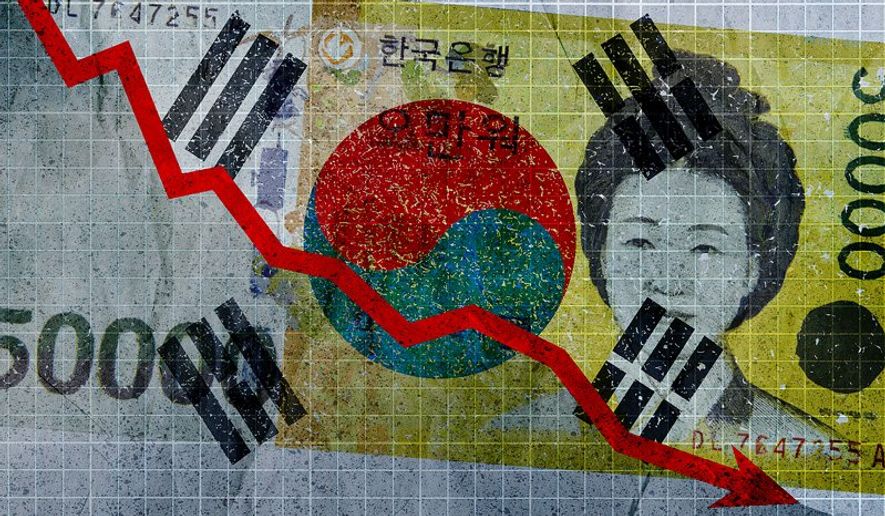OPINION:
Once a roaring Asian Tiger, South Korea is turning into a mewling pussycat — and, with North Korea again rattling nuclear sabers, the timing could not be worse.
South Korean economic growth in the third quarter fell to just 0.4 percent and the expectation for 2019 as whole is, at most, 1.8 percent, the worst in a decade. In 2007, South Korea had the same gross domestic product as India, at $1.2 trillion. But 10 years later, India’s GDP had risen to $2.6 trillion and South Korea’s to only $1.5 trillion.
Lately, trade tensions have hurt, depressing demand from China, Korea’s number-one partner, and creating widespread uncertainty throughout Asia. But something more fundamental is at work here. Because of widespread corruption and a questionable adherence by government to the rule of law, international investors are finding Korea an inhospitable home for their capital.
A big deterrent to foreign investment is the cozy relationship between South Korea’s government and a handful of large domestic companies, including powerful family-controlled chaebol, conglomerates with overlapping ownership.
Because of a scandal involving Samsung, by far Korea’s largest company, and other chaebol, former President Park Geun-hye, the first popularly elected woman leader of an Asian nation, is now serving a 32-year prison sentence on charges that included bribery and abuse of power. The case led to a shorter sentence for Lee Jae-yong, Samsung’s vice chairman and the son of its chairman, who himself was convicted twice and pardoned twice (presidential pardons for corporate titans being a Korean tradition).
“South Korea has come too far and is too valuable an example of functioning democracy in Asia for its tired old practices of crony capitalism to continue,” said an article last year in the Financial Times. But Korea’s behemoth companies remain beneficiaries of government coddling, in part because they are viewed as the engine behind the nation’s phenomenal growth during the 1960s to 1990s, when GDP frequently exceeded 10 percent.
A particular danger today is the way the Korean government and the courts favor homegrown companies over foreign investors. For example, Swiss elevator maker Schindler Holding last year sued South Korea for more than $300 million in losses from deals with Hyundai Elevator, a subsidiary of one of the largest chaebol. Schindler charges that, through a series of transactions engineered by the chairwoman of Hyundai Group, its shareholdings were cut by more than half while “the government failed to exercise its regulatory authority” despite repeated complaints.
In a similar but much larger case, a U.S. real estate developer, Gale International, commenced a $2 billion arbitration against its government-backed partner, POSCO, and announced plans to file another $2 billion arbitration against the Republic of Korea in a dispute over a giant “smart” city called Songdo, built on 1,500 acres of reclaimed land near the South Korean capital of Seoul.
In 2001, Korea invited Gale to partner with POSCO Engineering to complete a $35 billion plan to build 20,000 apartments, a convention center with echoes of the Sydney Opera House, hotels, office buildings, a shopping mall, Jack Nicklaus golf course and a 100-acre preserve modeled on New York’s Central Park.
Korea’s goal was to create a foreign investment hub to rival Hong Kong and Singapore. But, according to Gale, both Korea and POSCO Engineering took steps to oust the American partner from the project. Gale contends that POSCO Engineering overcharged the partnership more than $300 million for construction work, and illegally seized and sold Gale’s shares of the development project — all with the government’s approval. South Korea itself “expropriated a substantial portion of Gale’s investment in an unlawful manner,” Gale charged.
POSCO Engineering is a subsidiary of POSCO Group, a conglomerate that includes the fifth-largest steel company in the world. Originally a state enterprise that was privatized in 2000, POSCO is not strictly a chaebol, but its ties to South Korea’s political leadership are strong, and the firm was implicated in the scandal involving President Park as well as previous affairs of corruption.
Gale claims that, working with POSCO Engineering, the South Korean government “conspired to divest Gale of its investments, and used its public powers to harass and coerce Gale into ceding valuable rights.” Gale started proceedings against POSCO in the International Chamber of Commerce and the U.S. District Court in New York in March and announced that it planned to start arbitration proceedings at the World Bank’s International Center for Settlement of Investment Disputes against the government.
The case provides a good illustration of why foreign investors and operating businesses have grown so wary of risking their capital in South Korea. In The Heritage Foundation’s 2019 Index of Economic Freedom, the country ranks 29th (just behind Qatar), with especially low — and falling — ratings for “government integrity” and “judicial effectiveness.”
Schindler and Gale aren’t alone. There are more such cases, including a $770 million suit last year by U.S. hedge fund Elliott Management against the Korea government, alleging undue influence in a merger between two Samsung subsidiaries. “The cases show growing investor anger against unfair business practices of chaebol and Seoul’s tolerance of them,” said Park Sang-in, an economics professor at Seoul National University.
These practices not only harm U.S. and European businesses; they also constrain South Korea’s economy at a time when it should be a glowing beacon of aspiration on the horizon of oppressed and poverty-stricken North Korea. The South should be thriving, and the best way to spur its economy is to end corruption and get serious about the rule of law.
• James K. Glassman served as Under Secretary of State for Public Diplomacy in the George W. Bush administration.




Please read our comment policy before commenting.